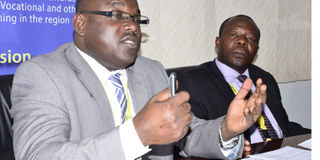Ubteb seeks Shs12 billion to conduct vocational exams

Ubteb Executive Secretary Onesmus Oyesigye (left) and his deputy, Dr Wilfred Nahamya, address journalists in Kampala on Friday. PHOTO BY ALEX ESAGALA
The Uganda Business and Technical Examinations Board (Ubteb) has asked government to double its budget for assessment to match the increasing number of students joining vocational and technical training.
The Ubteb executive secretary, Mr Onesmus Oyesigye, said the number of candidates, who registered for this year’s certificate and diploma technical and vocational assessment, increased to 80,306 from 61,253 last year, representing a 31 per cent rise.
Mr Oyesigye attributed the increase to a new modularised programme introduced by the National Curriculum Development Centre three years ago.
“It is becoming more costly to conduct these examinations. We have to look at the skills each student has attained in the course of study. We have put in our budget for next year. We will need Shs12 billion more to successfully conduct the examinations,” said Mr Oyesigye.
Currently, Ubteb’s budget is Shs13 billion.
The Ubteb candidates begin the examinations today. The areas that are being assessed include national certificate (technical and vocational), Uganda community polytechnic certificate (Primary Seven leavers), advanced craft, technical diploma, higher diploma and certificate in business and humanities.
However, it was observed that advanced craft was phased out in 2016 and the 905 candidates, who registered for it, will be the last to be assessed. The examination centres are spread in 572 institutions with 3,500 practical examiners deployed to mark the practical examinations on spot. Another 934 supervisors, scouts and area coordinators and an unspecified number of police officers have been deployed to oversee the conduct of the examinations that will be concluded on December 17.
“You either know or you don’t. During the practical sessions, students apply the knowledge they have acquired while the instructors are observing. After this, the students should be ready for employment immediately,” Mr Oyesigye said.
Dr Wilfred Nahamya, the Ubteb deputy executive secretary, explained that more people are getting interested in the modularised programmes, which are flexible, and enable one to easily find work after.
A student on a modular programme has a minimum of eight modules, each focusing on a particular skill.
“Modular programmes emphasise flexible learning. A paper has a set of competences to be achieved for each module. Once one has the skill, they can go and work before enrolling for another module. But they will not have a certificate unless they have completed all the modules,” Dr Nahamya said during a press briefing at Ubteb offices in Kampala on Friday.
The board warned that they have introduced stringent penalties for students who will be caught cheating.
For example, a student found culpable will have their examinations cancelled for a semester and if the vice is repeated, all their papers for that year will be affected. If the student does not change, they will be discontinued.




